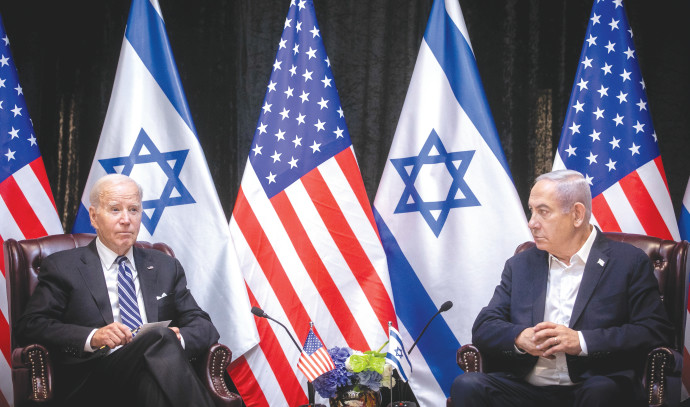Israel will forever be grateful to US President Joe Biden for the support that he showed the battered country in the days immediately following the October 7 massacre.
Israel will forever be grateful for the way he stood by the country in its darkest hour, how he warned Iran and its proxy Hezbollah not to take advantage of the situation and fully open other fronts against Israel, and how he sent US aircraft carrier strike forces to the region to back up those warnings. And, indeed, Iran and Hezbollah were deterred.
Israel will forever be grateful for the way Biden immediately launched an arms airlift to the country, making good on his promise to ensure that Israel has the wherewithal to defend itself.
The country will also long remember the way he came here 11 days after Hamas’s attack, the first US president to visit Israel in time of war, and relieved the country’s stunning feeling of isolation by demonstrating genuine sympathy and empathy.
Many, frankly, were surprised by the Democratic president’s unequivocal, unstinting support. In the days and weeks immediately following October 7, Biden did the right thing by Israel.
Hamas welcomed the resolution that the US allowed to pass
On Monday, by instructing the US not to veto Security Council Resolution 2728 calling for an immediate ceasefire for Ramadan that will lead to a “lasting sustainable” ceasefire but not making that contingent on the Security Council’s call in the same resolution for Hamas – which it has yet to condemn for October 7 – to release all the hostages, he did the wrong thing by Israel.
It did not take long for the consequences of this action to be felt.
Just hours after Hamas welcomed the resolution (imagine the UN Security Council passing a resolution that ISIS or al-Qaeda, Hamas’s twins, would welcome), the terrorist organization turned down the terms painstakingly hammered out in weeks of negotiations for a ceasefire and hostage release deal.
The refusal of the Security Council to even once – either through a resolution or in a statement put out by its president – condemn Hamas for its October 7 atrocity is staggering. Especially considering that the council knows how to condemn terrorism when Israel is not on the receiving end.
For example, on March 22, one day after a terrorist attack in Moscow killed some 140 people, the council issued a statement condemning “in the strongest terms the heinous and cowardly terrorist attack.”
The council swiftly issued a similar statement on Wednesday, within 24 hours of when a suicide bomber in Pakistan killed five Chinese workers and their Pakistani driver.
Yet it’s now 174 days since terrorists murdered 1,200 people in Israel, kidnapped more than 240 hostages, raped women, burned babies, mutilated bodies, set fire to entire communities, and no similar statement from the Security Council has yet been issued.
And some still wonder why Israelis are cynical of world opinion and not particularly moved by Security Council actions.
It is clear why Hamas rejected the hostage deal
Just as it was clear why Hamas would welcome Monday’s Security Council resolution, it is also equally clear why it rejected the hostage deal on the table.
Hamas welcomed the resolution despite its call for an immediate release of all the hostages, because it knows that the world will focus on the first part of the first clause in the nonbinding resolution – pressing Israel hard to stop the fighting – and pay less attention to the second part of that same clause: a call for Hamas to release all the hostages.
Why will the world not press the second part of that clause? Because it knows full well that Hamas operates way outside the bounds of civil society and that the terrorist organization is not going to heed any such call.
It was also clear following the resolution that Hamas would stiffen its conditions on a hostage deal, sensing that if it just holds out longer, international pressure will force Israel to stop the war, enabling the terrorist group to survive to fight – meaning to murder, rape, and mutilate – another day. Security Council Resolution 2728 undoubtedly strengthened Hamas’s feeling that the international community would “deliver” Israel.
Prime Minister Benjamin Netanyahu’s office put out a statement saying as much on Tuesday. “Hamas’s stance clearly demonstrates its utter disinterest in a negotiated deal and attests to the damage done by the UN Security Council’s resolution.”
While there is a tendency among many pundits and most opposition politicians to reject anything Netanyahu says and to reflexively place the blame on Netanyahu rather than Biden whenever the two are at odds, in this case, that reflex is misplaced.
Put aside whether, as a result of the US failure to veto the resolution, it was wise for Netanyahu to cancel Strategic Affairs Minister Ron Dermer and National Security Council head Tzachi Hanegbi’s trip to Washington this week to consult on how to pursue the war in Rafah (it wasn’t), and whether moves such as these have political motivations (they do). Nevertheless, Netanyahu is not always to blame in these confrontations with America, nor is Biden always free of fault.
Don’t assume that another PM would have better relations with the US
On Tuesday, one leading columnist wrote in Yediot Aharonot: “Do we need anything more than what is happening in our relations with America to understand the abyss the prime minister is leading us into? What else needs to happen to understand that every additional day he sits in his chair, our international situation deteriorates, and the crisis with our biggest and only friend – our arms supplier – gets worse?”
The columnist assumes that were someone else sitting in the prime minister’s chair right now, with the war in Gaza in its sixth month and pictures of Palestinians suffering flooding the traditional and social media in the West, Israel’s situation in the world would be any better.
But that is an erroneous assumption.
Had even Yesh Atid’s Yair Lapid been prime minister when October 7 happened, it is hard to believe that the country’s policies toward Hamas and the IDF’s way of prosecuting the war would be that significantly different from what they are now. While perhaps there would be more of an emphasis on the “day after” and a more receptive ear to international pleas for more humanitarian aid into Gaza, Israel would have the same war aim it has now of destroying Hamas’s capabilities.
That aim – unfortunately, because of the way Hamas has chosen to fight – will lead to a high number of Palestinian civilian casualties and much Palestinian suffering, regardless of who is sitting in the Prime Minister’s Office. And it is those casualties and that suffering that, more than anything, are driving the wedge between Jerusalem and Washington.
If you doubt this, look back to the days of the Naftali Bennett and Lapid tag-team government and think whether Israel’s position among the progressive Democrats in the US was that much better than it is under Netanyahu. It wasn’t, because the anti-Israel progressives and “social justice activists” who are all impacting Biden’s policies right now during an election year are opposed not only to Netanyahu but to Israel itself, regardless of who leads the country.
In their minds, Israel is an instrument of white supremacy and imperialism, and regardless of the identity of the prime minister or composition of his government, the Jewish state would still be an illegitimate, racist, colonialist enterprise in their eyes.
US officials were quoted as saying that Netanyahu’s decision not to send Dermer and Hanegbi to Washington for consultations was motivated by political considerations. And they are probably right. Being seen as willing to stand up to US pressure plays well politically with Netanyahu’s base.
But there is something disingenuous in this criticism of Netanyahu for letting political considerations influence his policies. Are not political considerations now also heavily influencing Biden’s policies in this crisis?
Last month, the US vetoed a similar resolution at the Security Council calling for an immediate ceasefire. Why did it not do the same thing now? What changed in the interim?
Several things changed. Among them is that the casualty figures in Gaza continue to rise, and another is that Biden is getting pounded by progressive Democrats and Arab Americans for his support of Israel.
Biden’s tone and the tone of his administration have changed markedly in the last two months, and that has to do with Arab Americans voting – or not voting – in Michigan and with progressives unenthused by the Biden campaign, harshly critical of his Israel policy, and threatening either to vote for a third party candidate or stay at home on Election Day, November 5.
Both Biden and Netanyahu are political animals, and both are using their disagreements for their own political purposes. But to say this is all Netanyahu’s fault, and that Israel’s position in the world and in Washington would be sterling even amid a war such as this if someone else were calling the shots in Jerusalem, is unrealistic.
This doesn’t mean that Netanyahu’s handling of the relationship with the US during the war has been flawless. It most definitely has not.
For example, Netanyahu could have played Monday’s Security Council resolution completely differently – accept a two-week ceasefire for the duration of Ramadan to win favor with the Biden administration and the world, and then resume fighting at the end of the Muslim holy month if Hamas did not release the hostages. At that point, Israel could say that it fulfilled the resolution, but Hamas did not – placing the onus on the terrorist organization.
Netanyahu could have done things differently, but not all the tensions in the relationship can be dumped on his doorstep. Netanyahu – with all his faults – is not always wrong, nor is Biden – with all the support he has given Israel since October 7 – always right, as various opposition leaders and leading voices in the media lamenting the current tension in the relationship would have one believe.
Monday’s Security Council resolution is a case in point.







